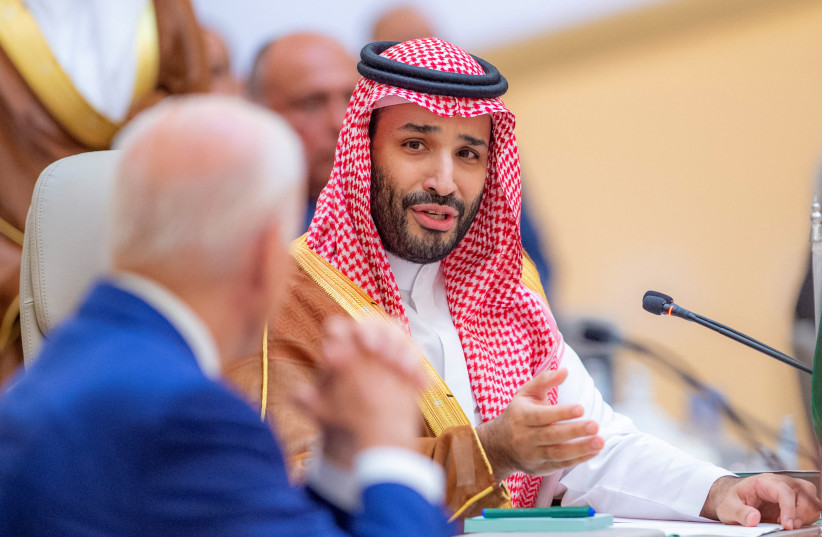President Joe Biden recently threatened Saudi Arabia with “consequences” following the OPEC+ announcement of their intention to cut oil production by two million barrels a day, starting next month. Senior Democratic elected officials are joining the president and have announced their intentions to target the long-standing US-Saudi security alliance by demanding a freeze on any cooperation with Saudi Arabia, including arms sales and security cooperation beyond what is necessary to defend US personnel and interests.
Additional Democratic leaders are considering other ways to punish our Saudi allies. Senator Richard Blumenthal introduced legislation this week that would create a one-year halt to all proposed direct commercial sales and foreign military sales to the Kingdom of Saudi Arabia. It should be noted that Blumenthal, and many of his fellow Senate Democrats, voted in favor of a $650 million missile deal to Saudi Arabia less than one year ago. Nor did they object to the $3 billion deal with Saudi Arabia for defensive missiles that the Biden administration approved in August.
This dangerous escalation will cause tremendous damage to our relationship with one of our most important strategic allies. The Biden administration must ratchet down the rhetoric and emotional outbursts, and ensure that this strategic alliance remains solid.
Since the Biden administration came into power, it has targeted the Saudi leadership. President Biden labeled Saudi Arabia as a “pariah,” sanctioned members of the Saudi defense establishment, and publicly disparaged Crown Prince Mohammed bin Salman on several occasions.
The crown prince, considered the de facto ruler of Saudi Arabia, was recently named as the country’s prime minister. Biden’s pursuit of a new Iran deal, and delisting of the Houthis as a “foreign terrorist organization,” have caused alarm among the Saudi leadership. The public tension between the nations is taking an ever-increasing toll.

Although Biden visited Saudi Arabia in July, the relationship between the two nations has continued to deteriorate. The recent decision by the OPEC+ nations to reduce oil production is being depicted in Washington as a direct snub by the Saudis. Although 23 nations make up OPEC+, the White House is blaming Saudi Arabia alone for the production cuts.
Despite the threats from the Democratic leadership, the Saudis appear to have no intention of backing down. The Saudi Arabian Foreign Ministry released a statement defending their position on the OPEC+ vote and reiterating that the eight-decade-old US-Saudi relationship is predicated on “mutual respect.”
In that same statement, the Saudis claimed the American government requested that the OPEC+ decision be delayed for another month. The clear implication is that the Biden administration and the Democratic party are terrified of how the oil production cuts and the accompanying increase in fuel prices will impact the midterm elections.
The fact that the threats against Saudi Arabia are only coming from Democrats is deeply concerning. It is problematic for any country to be the subject of a partisan divide, but it is exponentially worse if that country is the largest energy-producing nation in the world.
Relations souring between the two
AS US-Saudi relations continue to sour, Saudi Arabia’s relations with other international powers have expanded. Saudi-Chinese relations are blossoming, with China viewing Saudi Arabia as an essential aspect of its “Belt and Road” Initiative. Russian commercial and financial ties with Saudi Arabia continue to grow as well, despite the ongoing Russian-Ukrainian war.
While the Saudis rely heavily on US for military hardware, and no country can fill that role, the Saudis demonstrated again they will act independently by disregarding American foreign policy preferences. US-Saudi relations are not a one-way relationship. Without Saudi support, American initiatives in the Middle East, or in the greater Islamic world, may be doomed to failure.
While the strength of the US-Saudi Arabia relationship increased under the Trump administration, the relationship has benefited from decades-long bipartisan support in Washington. The American people understand the strategic importance the Saudis wield as the most powerful Sunni nation in the world, evidenced by the recent peace agreements between Israel and four Muslim nations, which would not have happened without the Saudis’ support.
As the crown prince ushers in more moderate and modernizing policies for the Saudi kingdom, it is crucial to realize that at 37 years old, he will most likely lead the kingdom long into the future. The US, therefore, should work to foster his moderation, not cast it aside.
Over the last two years, the US has gone from being a net exporter of oil to a net importer. Increased energy prices are wreaking havoc on the US economy. As the American people continue to recover from the horrific economic impact of COVID, we must ensure that our energy needs are safeguarded. It is vital that we maintain our relationship with our Saudi allies.
While there will always be policy disagreements between nations, these disagreements must be handled diplomatically. Our relationship with Saudi Arabia should have never devolved into public bickering and partisan threats. With major challenges to world peace and prosperity, our elected officials must make the right decisions regarding our strategic relationships. We cannot travel down a dangerous path and alienate our allies.
The writer is the CEO of Genesis10, a US IT consulting company. He serves as a member of the US Commission for the Preservation of America’s Heritage, on the Dean’s Advisory Board at Columbia University’s Graduate School of International and Public Affairs, and as a board member on USAID’s Nita M. Lowey Middle East Partnership for Peace.
